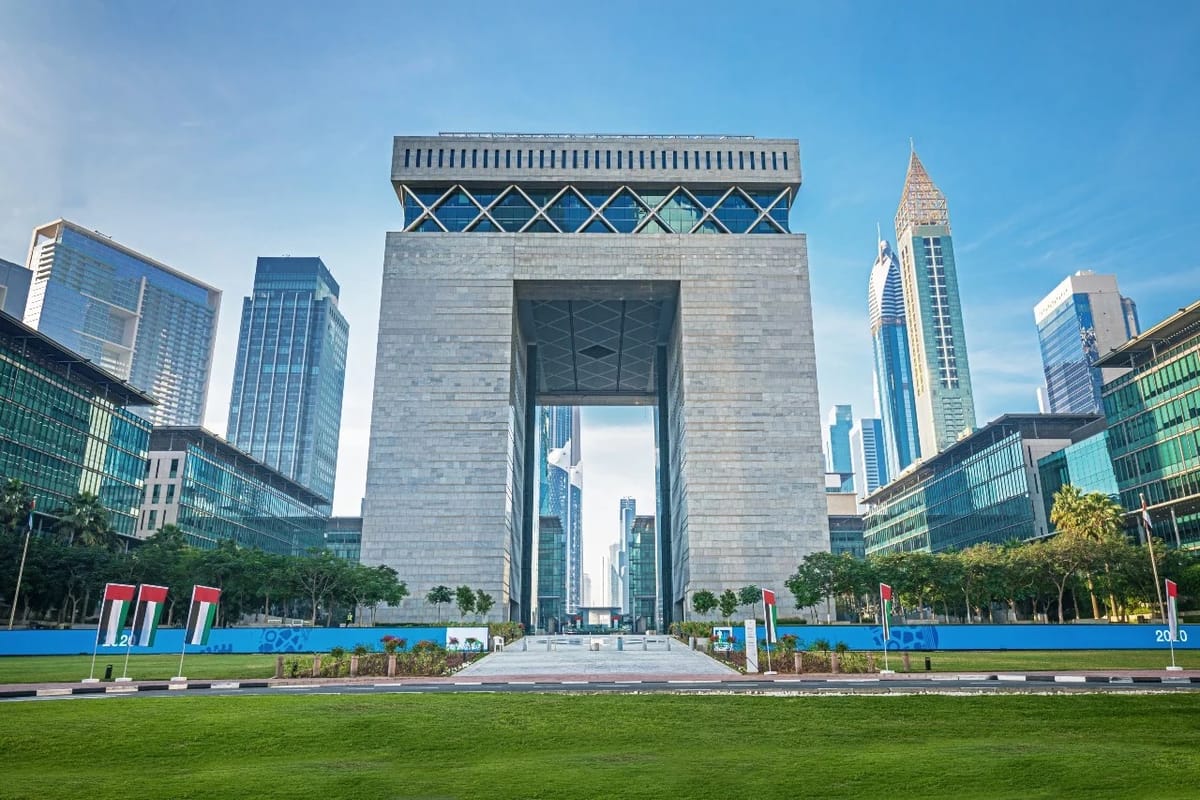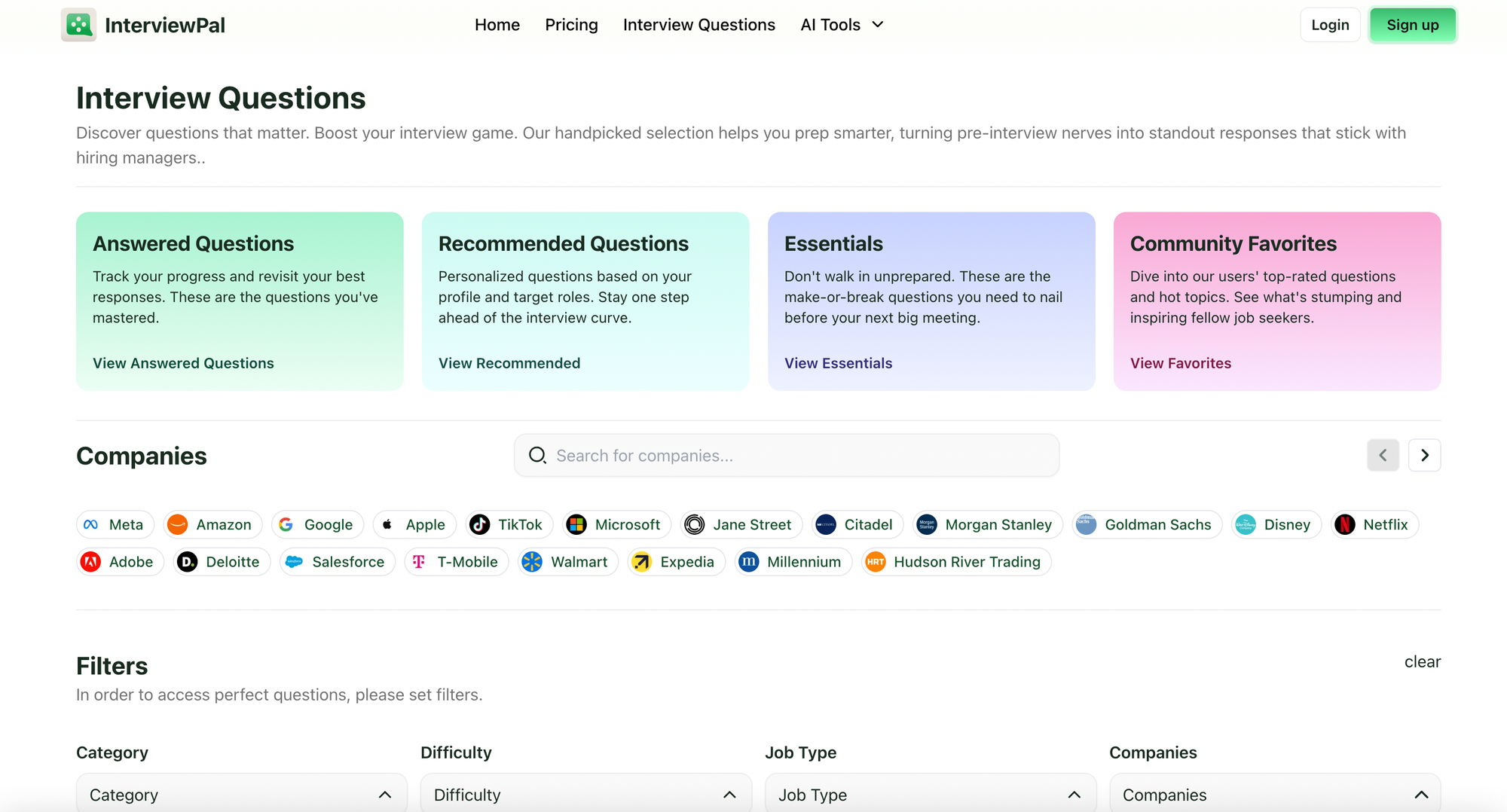Top Interview Questions in the Middle East Tech Market
Top interview questions asked in the Middle East tech market for 2025. Prepare smarter with tools, strategies, and country-specific insights.

The Middle East tech market is experiencing rapid growth, with countries like the UAE, Saudi Arabia, Egypt, Jordan, Qatar, and Bahrain emerging as vibrant technology hubs. Companies in these nations are investing heavily in digital transformation and seeking top talent to drive innovation. As a result, job interviews for tech roles in the Middle East can be highly competitive and often come with unique regional considerations. Candidates are expected to demonstrate strong technical expertise, excellent soft skills, and cultural adaptability. This article outlines the top technical and behavioral interview questions for popular tech roles – from software engineers and product managers to data analysts, DevOps engineers, and cybersecurity professionals – and highlights regional nuances to help you prepare with confidence.
Top Interview Questions for Software Engineers in the Middle East
Software engineering roles are in high demand across the Middle East, particularly in fast-growing markets like the UAE and Saudi Arabia. Employers look for candidates who excel in coding, problem-solving, and collaboration within diverse teams. In interviews, you should be ready for rigorous technical assessments as well as questions about teamwork and project experience.
Common Technical Questions:
- Data Structures and Algorithms: Interviewers often ask you to solve coding problems or explain algorithms. For example, you might be asked to reverse a linked list or discuss the time complexity of a sorting algorithm. Be prepared to write code on a whiteboard or an online editor and walk through your solution.
- System Design: You may face questions about designing scalable systems. An interviewer could say, “Design a web application architecture that can handle millions of users.” In the Middle Eastern context, consider aspects like supporting multiple languages (English/Arabic) and regional data centers for better latency.
- Programming Concepts: Expect questions on programming languages or frameworks relevant to the job. For instance, “What is the difference between synchronous and asynchronous execution in JavaScript?” or “How does Python manage memory?” Demonstrating a solid grasp of your preferred language’s fundamentals is key.
- Teamwork in a Multicultural Environment: Given the multicultural workplaces in cities like Dubai or Riyadh, you might be asked, “Tell me about a time you worked on a diverse team.” Interviewers want to see that you can collaborate with colleagues from different backgrounds. Describe how you communicated effectively and resolved any misunderstandings.
- Project Challenges: A typical question is, “Describe a challenging project you worked on and how you handled obstacles.” Highlight your problem-solving process, adaptability, and how you stayed on schedule. Employers in the region value candidates who can perform under pressure and tight deadlines.
- Learning and Adaptability: You may be asked, “How do you keep your technical skills up to date?” or “Tell us about a new technology you learned recently.” Emphasize your initiative in continuous learning – for example, mention attending regional tech meetups or online courses. This shows your commitment to staying current in a fast-evolving field.
Tip: Practice coding interviews beforehand. Platforms like InterviewPal offer mock coding interviews where you can solve problems similar to those asked by Middle Eastern tech firms, and get AI-powered feedback on your solutions. This can help you refine your approach and communication under time constraints.
Top Interview Questions for Product Managers in the Middle East
Product management roles are crucial as companies localize and expand digital products for Middle Eastern markets. Interviewers will assess your strategic thinking, market insight, and leadership skills. In addition to general product management questions, be ready to discuss how you would adapt products to regional preferences and work with cross-functional teams.
Common Technical/Product Questions:
- Product Design and Strategy: A favorite prompt is, “How would you improve our app or product for users in the Middle East?” or "Share with me the specific actions you'd take to monetize a free app". You might be asked to design a new feature or localize an existing product. Discuss considerations like bilingual user interfaces (English/Arabic), right-to-left text support, or integration with region-specific payment systems. Your answer should demonstrate user-centric thinking and knowledge of local user behavior.
- Prioritization and Roadmapping: Interviewers often ask something like, “If you have feature A and feature B and can only choose one for the next release, how do you decide?” Explain your prioritization framework – for example, weighing customer impact, strategic alignment, and effort. Showing a structured approach to decision-making is vital.
- Market Knowledge: You could be asked about tech trends or competition in the region: “What tech products or startups in the Middle East do you admire and why?” Having concrete examples from the UAE or Saudi Arabia’s startup ecosystem will show that you’re plugged into the market dynamics.

Suggested Reading
Common Behavioral Questions:
- Leadership and Team Collaboration: Expect questions like “Tell me about a time you led a cross-functional team to deliver a product.” Describe how you coordinated between engineers, designers, and stakeholders. Middle Eastern workplaces may include team members from various cultures; highlight your ability to bridge communication styles and keep everyone aligned on goals.
- Stakeholder Management: An interviewer might ask, “How do you handle conflicting feedback from senior stakeholders?” This probes your diplomacy and communication skills. You should provide an example of balancing executive input with user needs, showing respect and cultural sensitivity (for instance, how you might navigate a discussion with a government client vs. a private sector client).
- Adaptability: “Describe a situation when a project didn’t go as planned – how did you respond?” is a common question. In your answer, emphasize your problem-solving and resilience. Product managers in the Middle East often deal with shifting market conditions or regulatory changes, so convey that you remain calm under pressure and can pivot strategy when needed.
Tip: When answering product management questions, mention any familiarity with the region’s consumer culture or regulations if relevant. For example, understanding local e-commerce laws or user behavior during Ramadan can set you apart. You can also use InterviewPal’s industry-specific question banks to practice scenario questions relevant to Middle Eastern markets, helping you refine your strategic responses.
Top Interview Questions for Data Analysts in the Middle East
Data analysts (and related roles like data scientists) are in high demand as organizations in the Middle East leverage data for decision-making. Whether it’s a bank in Bahrain or a telecom company in Egypt, expect interview questions that test your technical analytics skills and your ability to communicate insights effectively. Be prepared for practical exercises as well as behavioral questions about collaboration and attention to detail.
Common Technical Questions:
- SQL and Data Querying: It’s very common to face an SQL problem. For example, “Write a query to find the top 5 selling products from last month’s sales data.” You should be comfortable with joins, aggregations, and subqueries. Some companies might give a live SQL exercise or a take-home data task.
- Data Interpretation: You may be presented with a chart or data snippet and asked, “What trends do you see, and what recommendations would you make?” or "After executing a new sourcing strategy, how do you analyze its effectiveness and determine if it should be used again in the future?". Practice interpreting data visualizations relevant to the region – for instance, analyzing user growth in a mobile app across the UAE and Saudi Arabia, noting any regional differences. Show that you can translate numbers into meaningful business insights.
- Tools and Techniques: Expect questions on the tools you’ve used (Excel, Python, Tableau, etc.) and basic statistics. An interviewer might ask, “How would you handle missing or dirty data in a dataset?” or “Explain the concept of A/B testing.” Demonstrating a methodical approach to data cleaning and experimentation is important.
Common Behavioral Questions:
- Communication with Non-Technical Stakeholders: A likely question is, “Tell me about a time you had to explain a complex analysis to a non-technical team member or client.” In your answer, highlight how you tailored your communication – perhaps you simplified technical jargon or used a compelling visualization. Effective communication is crucial, especially in a multilingual environment where clarity is key.
- Detail Orientation and Accuracy: You might be asked, “Describe a time you caught an error or discrepancy in data. What did you do?” This is to gauge your thoroughness. Provide an example (maybe spotting a data entry error in a report) and explain how you corrected it and implemented checks to prevent future issues.
- Collaboration and Deadlines: Data analysts often juggle requests. An interviewer could ask, “How do you prioritize multiple data analysis projects when everything is high-priority?” Discuss any strategy you use to manage time and expectations, such as communicating with stakeholders or using project management tools. Employers in fast-paced Middle Eastern companies value someone who can handle pressure gracefully.
Tip: Before an interview, research if the company must adhere to any local data privacy laws (such as Bahrain’s Personal Data Protection law or others) and consider mentioning compliance in your answers if relevant. When practicing, use InterviewPal’s mock interviews to simulate explaining your analysis process out loud – the AI feedback can help you become clearer and more confident in delivering your insights.
Top Interview Questions for DevOps Engineers in the Middle East
DevOps and cloud engineering roles have grown as the Middle East shifts to cloud infrastructure and continuous deployment practices. Companies in Qatar, Oman, and beyond are seeking DevOps talent to ensure their services are scalable, reliable, and secure. Interviews for these roles dive into your technical know-how of systems and also how you handle the high responsibility that comes with keeping critical systems running.
Common Technical Questions:
- Cloud Infrastructure & CI/CD: Be ready for questions like “How would you set up a CI/CD pipeline for a new application?” or “What is your experience with cloud platforms like AWS or Azure?” Interviewers want to know you can automate deployments and manage cloud resources. For instance, you might need to discuss using Jenkins or GitHub Actions for CI, and how to deploy to AWS with auto-scaling and load balancing.
- Containers and Microservices: It’s common to be asked, “What is the difference between a virtual machine and a Docker container?” or “How do Kubernetes pods work?” Explaining these concepts clearly will show your foundational knowledge. Additionally, you might get scenario questions such as how to migrate a monolithic application to a microservices architecture.
- Security and Backup: Given the focus on reliable services, an interviewer might ask, “How do you ensure the security and backup of production systems?” You should mention practices like infrastructure as code (for consistency), monitoring and alerting tools, setting up firewalls/VPCs, and regular backups. In some cases, local regulations may require data to be stored within country borders, so awareness of cloud regions and data residency could be a plus.
Common Behavioral Questions:
- Incident Management: Expect a question such as, “Describe a time you encountered a critical system failure. How did you handle it?” Walk through how you stayed calm, troubleshot under pressure, communicated with the team, and fixed the issue. Middle Eastern companies, like others globally, highly value reliability – showing that you can quickly recover from incidents is crucial.
- Cross-Team Communication: DevOps sits between development and IT operations, so you might be asked, “How do you handle situations when developers push back on DevOps recommendations or vice versa?” This assesses your collaboration and persuasion skills. Provide an example of how you facilitated a compromise or educated the team on best practices, maintaining respect and good relationships.
- Adaptability and Continuous Improvement: An interviewer could ask, “What was a DevOps process you improved or automated in your last job?” They want to see that you proactively seek efficiency. Talk about any script or tool you created to save time (for example, automating a deployment script that used to be manual) and the impact it had on the team.
Tip: Emphasize any experience with projects in the Middle East, such as setting up servers in local data centers or handling traffic surges during regional events (like shopping festivals or Ramadan). When preparing, consider practicing with InterviewPal’s DevOps question bank to refresh topics like cloud architecture, as the platform can quiz you on industry-specific scenarios and give instant feedback on your answers.

Top Interview Questions for Cybersecurity Professionals in the Middle East
Cybersecurity is a top priority as Middle Eastern governments and companies invest in protecting critical infrastructure and data. In the Gulf region, sectors like banking, energy, and telecom require skilled cybersecurity analysts and engineers. Interview questions will assess your technical expertise in security and your judgment in handling sensitive situations. You’ll need to demonstrate both your knowledge of security principles and your integrity and discretion.
Common Technical Questions:
- Security Fundamentals: You will likely be quizzed on core concepts. For example: “What is the difference between symmetric and asymmetric encryption?” or “How does HTTPS ensure secure communication?” Clear, concise explanations of these basics are essential. Interviewers might also ask about common vulnerabilities (e.g., “Explain what an SQL injection is and how to prevent it.”).
- Threat Response Scenarios: Be prepared for scenario-based questions like, “If we suspect a server has been breached, what steps would you take to investigate and secure the system?” Outline a methodical incident response: isolate the system, preserve logs, identify the vulnerability, patch it, and communicate with necessary stakeholders. They want to see your problem-solving approach under a potential crisis.
- Regulations and Standards: Given the rise of cybersecurity regulations in countries like the UAE and Saudi Arabia, you might be asked, “Are you familiar with any cybersecurity frameworks or compliance standards?” Mention experience with standards such as ISO 27001, NIST, or local data protection laws if you have it. Even if not explicitly asked, demonstrating awareness of regional security compliance (for instance, Saudi Arabia’s SAMA regulations for banking security) can be impressive.
Common Behavioral Questions:
- Ethical Judgment: An interviewer might pose a question like, “What would you do if you discovered a colleague violating security protocols?” Here they assess your integrity and professionalism. A strong answer would involve reporting the issue through proper channels and explaining the importance of compliance to the colleague, all while maintaining discretion.
- Communication of Risk: You may be asked, “Tell me about a time you had to convince management to invest in a security solution.” This is about translating technical risks into business terms. Describe how you used evidence (perhaps the cost of a potential breach vs. the cost of the solution) to persuade decision-makers. In the Middle East, where some firms are newer to comprehensive cybersecurity, your ability to advocate for security is valuable.
- Continuous Learning: Cybersecurity is ever-evolving, so expect “How do you stay updated on the latest cybersecurity threats and tools?” Share your involvement in the security community – for example, attending security conferences in the region, following global threat reports, or obtaining certifications. This shows passion and proactiveness, qualities that interviewers in this field seek.
Tip: In Middle Eastern contexts, some cybersecurity roles (especially with government or defense ties) may involve extensive background checks. While this isn’t an interview question per se, it means trustworthiness and a professional demeanor are being evaluated from the start. Be sure to highlight any certifications (like CISSP, CISM) or training, as well as your commitment to ethics. To prepare, practice articulating your security projects and achievements – you can use InterviewPal’s mock interview tool to rehearse talking about complex security topics in a clear way.
Tips for Effective Interview Preparation (and How InterviewPal Can Help)
Preparation is the key to excelling in any interview, and this is especially true in a competitive market. Here are some final tips to help you get ready for your Middle East tech interviews:
- Research the Company and Role: Thoroughly study the organization’s mission, recent projects, and the specific job description. Whether it’s a fintech startup in Bahrain or a large telecom in Egypt, understand what skills and qualities they value. This will help you tailor your answers to show you are the perfect fit. It also enables you to answer “What do you know about our company?” or “Why do you want to work with us?” or even " Why Are You Applying for This Position?" confidently, tying your aspirations to the company’s goals
- Practice Common Questions: Rehearse answers to both technical and behavioral questions. For technical prep, solve coding problems or relevant case scenarios. For behavioral questions, consider using the STAR method (Situation, Task, Action, Result) to structure your responses with clear examples. InterviewPal’s platform can be a great asset here – you can utilize its AI-powered mock interviews to simulate a real interview environment. After each practice session, you’ll receive feedback on aspects like clarity, pacing, and content, allowing you to refine your answers.
- Improve Communication Skills: Since English will likely be the medium (and possibly Arabic for certain roles), practice speaking clearly and professionally. If you’re not a native English speaker, consider doing some mock interviews in English to get comfortable with technical vocabulary. Likewise, if some Arabic might come up and you’re conversational, practice a brief self-introduction or key industry terms in Arabic. InterviewPal’s tools include industry-specific question banks, which can expose you to terminology and questions tailored to your field, helping you articulate your thoughts better.
- Be Ready for Various Interview Formats: Middle East companies may use a mix of screening methods – HR phone screens, technical assessments (including take-home tests or live coding), panel interviews, and even psychometric tests for certain roles.
- Be mentally prepared for a multi-stage process. For example, a government-related role might include an assessment center or written exam. By practicing across different formats (one-on-one, panel, virtual interviews), you’ll be adaptable. Utilize InterviewPal’s versatility to practice answering questions in a video interview format as well, since remote interviews are common.
By following these tips and leveraging tools like ours (from practice interviews to feedback analytics), you can approach your interviews with greater confidence and competence. Each practice session will make you more fluent in telling your story and answering tricky questions, so on the big day you can focus on building a genuine connection with the interviewers.
In conclusion, interviewing for tech roles in the Middle East is an exciting opportunity to be part of a booming tech scene. The top interview questions for software engineers, product managers, data analysts, DevOps engineers, and cybersecurity professionals tend to revolve around core technical skills and the ability to fit into a dynamic, culturally diverse work environment. By preparing for the questions outlined above and keeping regional nuances in mind – from language proficiency to professional etiquette – you will be well on your way to success. Remember to practice thoroughly, stay calm and authentic during the interview, and demonstrate both your expertise and your eagerness to contribute to the organization’s mission. With diligent preparation and the right resources at your disposal, you can step into your Middle Eastern tech interviews prepared to impress and to take the next big leap in your career. Good luck!






